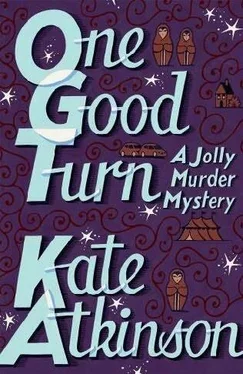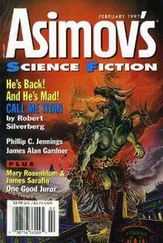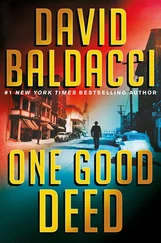Kate Atkinson - One Good Turn
Здесь есть возможность читать онлайн «Kate Atkinson - One Good Turn» весь текст электронной книги совершенно бесплатно (целиком полную версию без сокращений). В некоторых случаях можно слушать аудио, скачать через торрент в формате fb2 и присутствует краткое содержание. Жанр: Триллер, на английском языке. Описание произведения, (предисловие) а так же отзывы посетителей доступны на портале библиотеки ЛибКат.
- Название:One Good Turn
- Автор:
- Жанр:
- Год:неизвестен
- ISBN:нет данных
- Рейтинг книги:4 / 5. Голосов: 2
-
Избранное:Добавить в избранное
- Отзывы:
-
Ваша оценка:
- 80
- 1
- 2
- 3
- 4
- 5
One Good Turn: краткое содержание, описание и аннотация
Предлагаем к чтению аннотацию, описание, краткое содержание или предисловие (зависит от того, что написал сам автор книги «One Good Turn»). Если вы не нашли необходимую информацию о книге — напишите в комментариях, мы постараемся отыскать её.
One Good Turn — читать онлайн бесплатно полную книгу (весь текст) целиком
Ниже представлен текст книги, разбитый по страницам. Система сохранения места последней прочитанной страницы, позволяет с удобством читать онлайн бесплатно книгу «One Good Turn», без необходимости каждый раз заново искать на чём Вы остановились. Поставьте закладку, и сможете в любой момент перейти на страницу, на которой закончили чтение.
Интервал:
Закладка:
Then, of course, it was their own bed time. Martin wound the clock, checked the locks, waited while the woman had done whatever she did in the cold, slightly damp bathroom. One day, inevitably, this cottage would be modernized, bathroom suites and kitchen units, electric cookers and central heating installed, but now there was a certain sense of privation about it necessary to its time and place in British social history. Then he too would climb the stairs (narrow pine, a runner and brass rods) and enter their bedroom beneath the sloping eaves of the roof, where she would be waiting for him in a flower-sprigged nightdress, sitting up in their mahogany bed from a previous century, reading her book in a homely pool of light from the parchment-shaded lamp above the bed. “Marty, come to bed.”
No, that was wrong, she never called him Marty. That was wrong. Wrong, wrong, wrong. Martin , she called him Martin, the ordinary name of an ordinary man whom no one ever remembered.
The mother of the boy in the Toyota came hurrying out of the garage shop, clutching crisps and cola and chocolate bars. She glared at Martin (for no reason at all as far as he could see) and passed the results of her foraging to the boy in the backseat before driving off in a haze of exhaust. The boy turned to face Martin and held one finger against the glass of the window in an unmis-takable gesture.
It was only when he went inside the shop to pay that he remembered he didn’t have his wallet.
When Martin pulled up on the street outside his house, he discovered his driveway had been cordoned off with crime-scene tape and was being guarded by a uniformed constable. Martin wondered if there had been a fire or a burglary at his house, won-dered if he had inadvertently committed a crime-perhaps during those hours of oblivion at the Four Clans. Or had they finally come for him? Had he been traced through Interpol and now they were coming to arrest him and extradite him to Russia to make him face the music?
“Officer,” he said, “has something happened here?” (Was that what people said-“officer”-or was that what people said on American TV? Martin still felt horribly befuddled.)
“There’s been an incident, sir,” the policeman said. “I’m afraid you can’t go up to the house.”
Martin suddenly remembered it was Wednesday. “It’s Wednes-day.” He hadn’t intended to say that out loud, he must have sounded like an idiot.
“Yes, sir,” the policeman said, “it is.”
“The cleaners come on a Wednesday,” Martin said. “Favors-it’s an agency-has one of them had an accident?” Martin had only briefly met one or two of the pink-clad women who cleaned his house, he didn’t like the idea of being there while they scrubbed and polished around him, servants doing his dirty business for him, and he always tried to escape from the house before they saw him.
Had one of the “maids” electrocuted herself because he had faulty wiring, slipped on an overpolished floor, tripped on a badly fitted stair-carpet and broken her neck? “Is one of the cleaners dead?”
The constable muttered something into the radio on his shoul-der and said to Martin, “Can I have your name, sir?”
“Martin, Martin Canning,” Martin said. “I live here,” he added and thought perhaps he should have mentioned that earlier in the conversation.
“Do you have any identification on you, sir?”
“No,” Martin said, “my wallet was stolen last night.” It didn’t even sound convincing to his own ears.
“Have you reported the theft, sir?”
“Not yet.”On Leith Walk he had turned his pockets out and found four pounds and seventy-one pence. He offered to write an IOU for the rest, a proposition that was greeted with hilarity. Martin, who believed everyone should be treated as if he were honest until he proved himself otherwise (a policy that frequently left him fleeced), felt surprisingly pained that no one would afford him the same grace. In the end the only thing he could think of was to phone his agent, Melanie, and ask her to pay with her credit card.
The policeman on guard outside his house gave him a long, level look and muttered something else into his radio.
An old woman walked by slowly with an equally old-looking Labrador. Martin recognized the dog rather than the woman as a neighbor. Dog and woman lingered by the gateway. Martin realized there were several people on the other side of the road- neighbors, he supposed, passersby, a couple of workmen on their lunch break-who were all loitering in the same way, he was reminded for a moment of the spectators yesterday at Paul Bradley’s bloody street theater.
The old woman with the Labrador touched Martin on the arm as if they were old acquaintances. “Isn’t it terrible?” she said. “Who would have thought, it’s so quiet around here.” Martin rubbed the moth-eaten dog’s head behind its ears. It stood foursquare, immo-bile, only a faint quiver in the tail indicating enjoyment. The dog reminded him of the push-along dogs on wheels that children played with. He and his brother, Christopher, had one when they were little, some sort of generic terrier. Their father tripped over it one day and was so enraged that he picked it up by the handle and flung it as hard as he could, through the living room window. That was regarded as acceptable behavior in their home. Not home-“home front” was what their father called it. That had been a dress rehearsal for his throwing their real dog, a mongrel, through the window of the living room in married quarters in Germany. The toy dog survived, the real dog didn’t. Martin remembered throwing his laptop yesterday, was there something in him that had enjoyed that aggressive moment? Something, God forbid, of his father in him?
“And to think, no one heard a thing,” the old woman with the Labrador said.
“Heard what? What happened?”Martin asked her, glancing at the policeman, wondering if he was allowed to ask, if there wasn’t some great secret here that he wasn’t allowed access to. Perhaps they’d discovered Richard was a terrorist-unlikely, given his complete lack of interest in anything that wasn’t Richard Mott. Richard! Had something happened to Richard? “Richard Mott,” he said to the police-man, “the comedian, he was staying with me, has something happened to him?”The constable frowned at him and spoke into his radio again, more urgently this time, then he said to the woman with the Labrador, “I’m afraid I’ll have to ask you to move away, madam.”
Instead of moving away, the old woman shuffled closer to Martin and said in a conspiratorial whisper, “Alex Blake, the crime writer-he’s been murdered.”
“I’m Alex Blake,” Martin said.
“I thought you were Martin Canning, sir?” the policeman objected.
“I am,” Martin said, but he could hear the lack of conviction in his voice.
An earnest man introduced himself to Martin as “Superintendent Robert Campbell” and walked through the house with him as if he were an estate agent trying to sell a particularly troublesome property. Someone gave Martin what looked like paper shower caps to put over his shoes (“Still an active crime scene, sir”) , and Su-perintendent Campbell murmured softly, “Tread carefully, sir,” as if he were about to quote Yeats.
In the shambles of the living room, Martin glimpsed a couple of crime-scene technicians still at work-studious and unremark-able people, not glamorous and good-looking like the characters on CSI . There were no technicians of any kind in Martin’s nov-els, crimes were solved by intuition and coincidence and sudden hunches. Nina Riley occasionally resorted to asking advice from an old friend of her uncle’s, a self-styled “retired criminologist.” “Oh, dear old Samuel, what would a poor girl do without a brilliant mind like yours to call on?” Martin had no real idea what “criminologist” meant, but it covered a lot of gaps in Nina Riley’s education.
Читать дальшеИнтервал:
Закладка:
Похожие книги на «One Good Turn»
Представляем Вашему вниманию похожие книги на «One Good Turn» списком для выбора. Мы отобрали схожую по названию и смыслу литературу в надежде предоставить читателям больше вариантов отыскать новые, интересные, ещё непрочитанные произведения.
Обсуждение, отзывы о книге «One Good Turn» и просто собственные мнения читателей. Оставьте ваши комментарии, напишите, что Вы думаете о произведении, его смысле или главных героях. Укажите что конкретно понравилось, а что нет, и почему Вы так считаете.












